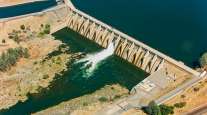Staff Reporter
DOT Announces BUILD Grant Recipients

The U.S. Department of Transportation announced the winners of its first round of Better Utilizing Investments to Leverage Development discretionary grants.
The BUILD grants are meant as a replacement for the Transportation Investment Generating Economic Recovery (TIGER) program, which was popular with state and local agencies. BUILD grants make $1.5 billion available to support road, bridge, rail, transit and port projects.
U.S. Transportation Secretary Elaine Chao and Deputy Secretary Jeffrey Rosen joined a group of lawmakers to make the announcement Dec. 11 at DOT headquarters. Ninety-one projects were selected for funding.
BUILD-2018 by Transport Topics on Scribd
“There’s a lot of need for investments in infrastructure across the country,” Chao said. “The project awards announced [Dec. 11] are one dimension of ongoing administration efforts to increase improvements of America’s infrastructure.”
Chao said that 69% of the funding this round has been directed to road projects, a record high for the program. The projects vary in size, ranging from a $25 million grant supporting a connector road linking Interstate 49 between the freight markets of Missouri and Arkansas to a $13 million grant to replace an I-70 interchange in Kansas City, Kan.

We're between seasons on RoadSigns but have created an intersession season as we get set for 2019. In Episode 1, we ask: How Does Congress Say Trucking? Are the planets finally aligning for movement on infrastructure funding? Hear a snippet above from Kellie Mejdrich of CQ Roll Call, and get the full program by going to RoadSigns.TTNews.com.
Many of the projects also focus on bridge improvements. North Carolina received $60 million, some $23 million of which will be used to replace 77 bridges across 17 counties.
In its largest grant through either the BUILD or the TIGER program, the Delaware River and Bay Authority received $22 million to install eight sheet pile cells at the base of the Delaware Memorial Bridge to better protect the structure from ship strikes. Every year, about 3 million commuters and 2 million trucks cross the bridge, which links Delaware to New Jersey.
“I often say that an ounce of prevention is worth a pound of cure, and that is particularly true when it comes to investing in the major assets that drivers in Delaware and all across our region depend on every day,” Sen. Tom Carper (D-Del.), the Environmental and Public Works panel’s top Democrat, said in a statement. “Addressing structural deficiencies on such a critical piece of infrastructure like the Memorial Bridge will improve maritime and travel safety on the northeast I-95 corridor, support our nation’s commerce industry and create good-paying jobs here at home.”
Certain lawmakers took to Twitter to declare their wins before DOT’s official announcement. Sen. Deb Fischer (R-Neb.) announced Dec. 6 that her state received $20 million to widen the 7-mile strip where U.S. Route 75 runs concurrently with U.S. 34 from two lanes to four lanes.
“Since fall of 2017, I’ve been advocating for this investment because it will improve road safety and connectivity between our communities,” Fischer said in a statement. “I’m thankful to Secretary Chao for her support of this important infrastructure project for Nebraska.”
NE will receive a $20 million @USDOT BUILD grant for a road expansion project stretching from Murray to Plattsmouth. I’ve advocated for this investment that will improve safety & connectivity in our communities. Thanks to @SecElaineChao for your support. https://t.co/BQYlj3SmYO — Senator Deb Fischer (@SenatorFischer) December 6, 2018
The BUILD program, under the moniker TIGER, began in 2009. Project sponsors submitted 851 applications for this round of funding.
“It was super competitive,” Rosen said.
Chao expressed hope that, in the coming year, lawmakers can reach a bipartisan infrastructure initiative. The White House’s infrastructure funding plan unveiled in February would rely on nonfederal funds for $1.3 trillion in order to reach a top line of $1.5 trillion over 10 years.
“Over the past month, it’s been frequently observed that infrastructure is a subject that’s especially ripe for bipartisan legislation,” Chao said. “This administration will continue to work with Congress to enhance existing infrastructure programs.”




